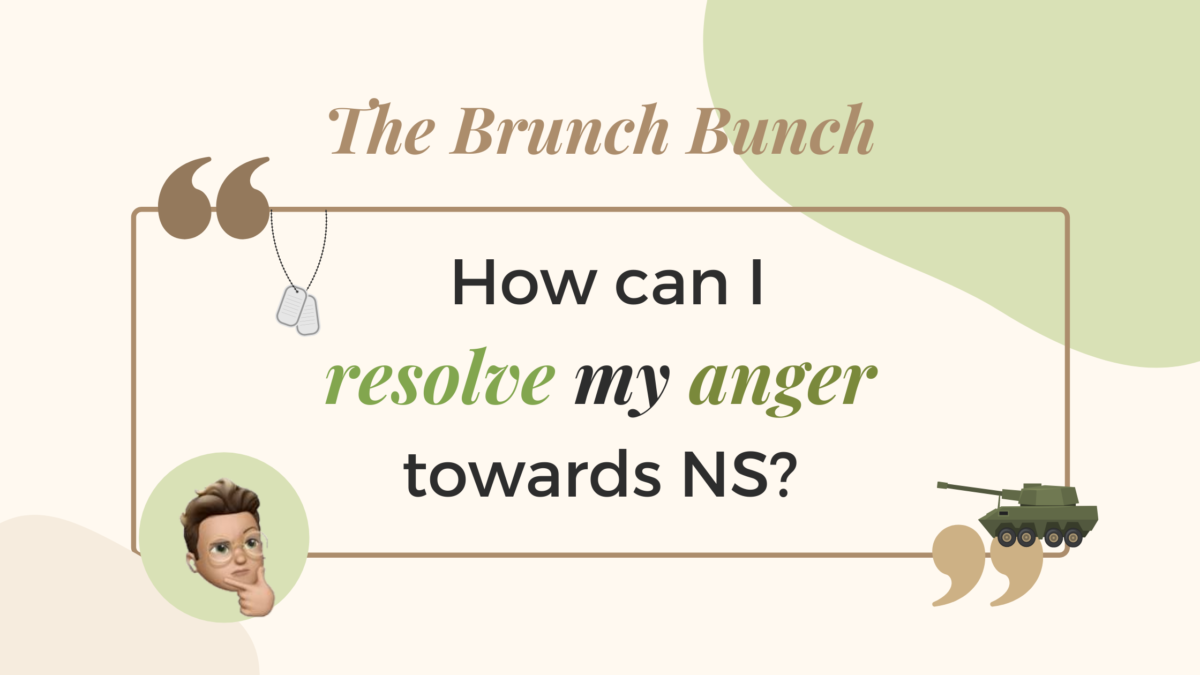Dear Brunch Bunch,
How do I resolve my anger that I had to serve two years of national service with no compensation?
Yours,
Boy
Dear Boy,
I’m sorry to hear that you feel anger at having to serve National Service. Since every Singaporean male has to go through NS regardless of whether they want to, it is understandable that you are unhappy about it. I’m unsure of the specific details in your case, so I will work with the understanding that your grievance of “no compensation” refers to the pay that you feel does not match the time and effort you have spent in NS.
To start off, I won’t waste time on empty consolations. While serving your country may sound nice, it’s not likely to make you view NS any better or feel happier about the experience. It’s a tough situation. It’s two years of your life you are wasting. Two years of learning how to dig a fire trench and mount an ambush and other skills you’re not gonna benefit from for the rest of your life. Two years of being put through the wringer and going through hell while many of your peers party and enjoy their youth.
It’s a tough situation.
And, now what?

You’re done with your National Service. You can’t get those years back. So, will you now spend the years after thinking back on it and how much you hated it, spending even more of your time and energy on NS? Isn’t that giving NS too much power? It’s not fair to yourself that you had to spend those two years doing something you did not want to. It’s even less fair that you spend the next few years feeling unhappy because of it.
The best thing for you to do now is not to give it that power. Refuse to let NS win. Force yourself to think about all the good that it has done you instead of the bad. Brainwash yourself if necessary. Because, let’s face it, all whom this anger will hurt is yourself. It won’t help you rewrite the past nor will it help you face the future.
I’ve always found forgetting and forgiving to be difficult, and impractical. It requires you to be in a special place of peace to achieve that. And I’m guessing you’re not there yet. But what I’ve found to be a much better motivator is sheer spite. When I was forced to take on Economics—a subject I hated with all my being—for my 11th and 12th grade classes, instead of Theatre—a subject I loved—spite is what got me through. I studied my ass off just to not let Economics win. And while I don’t look back on those years fondly now, at least I have the satisfaction of knowing that in that battle, I won.
I’m not comparing two years of Economics to two years of NS. But the principle is the same. Fuel that anger into spite, instead of self-pity or rage at the system. It’ll help you move forward instead of running in circles.
And how do you do so? By using those skills you learnt during NS to carve a better life for yourself. Because you did learn some skills, even if it is not obvious to you right now.
Forbes list of ‘The 12 Most Important Skills You Need To Succeed At Work’ comprises mostly soft skills: learnability, resilience, agility, collaboration, verbal communication, empathy, creativity, problem-solving, leadership, and negotiation. Chances are you picked up a handful of these skills during NS.
NS forces you into an environment of people from vastly different backgrounds, interests, and skills. During those two years you have to learn to get along with these people, to navigate those differences and make friends, and work together. You also have to learn to be ready for anything, be it adapting to the military schedule or sorting out your own needs. These are all valuable skills, even if you may not realise it now.
Use those skills to achieve success in your workplace and at college. And even if not at work, use those skills in your personal life to achieve more fulfilling relationships. There is more than one definition of success, just like there is more than one definition of happiness. Fulfilling relationships contribute to happiness just as much as financial, academic, or career success. Use those skills to become a better son, a better friend, a better boyfriend, and ultimately to inch closer to who you want to become.

Perhaps it’ll help you to hear about how NS has had practical benefits for many of my friends who had no working experience prior to serving NS. While they did not think well of the experience then—let’s be real, no one will think of sugarcoating it with the “this will be good for me years down the road!” thoughts when they are stuck in camp and unable to book out for the weekend for various reasons, or sweating buckets with the physical intensity of training.
However, the two-year vocation did eventually come in handy when beefing up their resumes as they were able to cite their responsibilities as proof that they can handle the demands of employment. Who knows, you may even be able to use it to negotiate for better remuneration! Everyone’s experience of NS is different, so consider your unique takeaways, be it resilience, interpersonal skills, or an enhanced sense of responsibility, and use them as selling points to potential employers. It is up to us to make the best out of our experience to benefit our future, instead of dwelling on the past.
Aside from helping you professionally, the years in NS also allow you the opportunity to build some very strong friendships. As they say, ‘a friendship forged in the fires of adversity is as strong as one that has weathered the test of time’. And is there any fire that burns quite as hot as NS? You can see those friendships as the fruits of your NS experience—they will be the best people to relate to your own memories and experiences in NS as they were there with you through it all. You can reminisce, or rant, about the not-so-great times in the past with your NS buddies, and you may find this to be an effective method to release your pent-up anger.
And if you don’t feel up to reliving those memories, try talking about the good times you had with the people you’ve spent your NS with. Even if these good times were very small moments like the time one of you snuck in a packet of chips and shared it around the dorm without the superiors knowing. Focus on those moments instead, and think about the fun you had.
Change your mindset about the time you’ve spent in NS by focusing on the positives, and you may reap some improvement. Of course, this is easier said than done, but it will become easier with conscious practice.
NS isn’t a waste, it’s two years of your life you are using. Two years of learning how to dig a fire trench and mount an ambush and other skills that have helped you learn adaptability, resilience, collaboration and more. Two years of being put through the wringer and going through hell together with your peers and forming iron-clad relationships.
Come to think of it, it’s kinda like school, isn’t it? For the longest time, you had very little choice in what subjects to take. But you took them without feeling like you were losing out because you saw some future benefit to the experience. Similarly, make yourself see the benefit to NS. That way you can move on and not let NS ruin the rest of your life.
It may not be easy to make peace with NS but I hope you find the strength to see the good in your NS experience—after all, it is how you make use of the past to better your future that matters!
Wishing you all the best,
Theodore
The Brunch Bunch is a student-led advice column for information and entertainment. The column is in no way meant to or supposed to substitute professional help. Questions regarding medical conditions or requiring professional help must always be sought from professionals.


